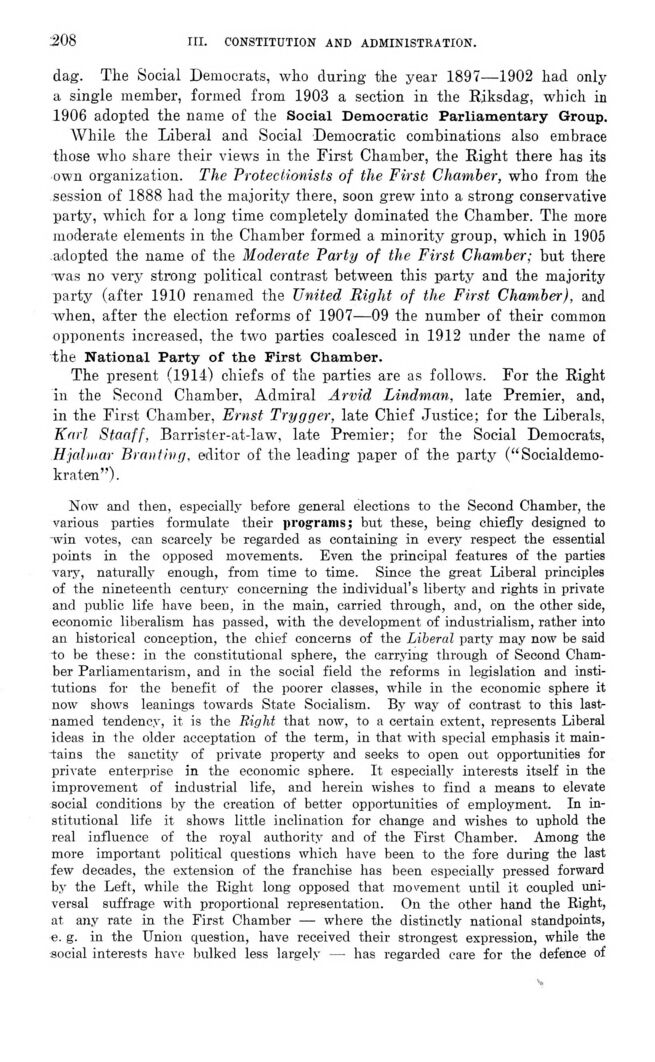
Full resolution (JPEG) - On this page / på denna sida - III. Constitution and Administration. Introd. by E. Hildebrand - 1. Constitution. By E. Hildebrand - Political Parties. By H. Brulin

<< prev. page << föreg. sida << >> nästa sida >> next page >>
Below is the raw OCR text
from the above scanned image.
Do you see an error? Proofread the page now!
Här nedan syns maskintolkade texten från faksimilbilden ovan.
Ser du något fel? Korrekturläs sidan nu!
This page has never been proofread. / Denna sida har aldrig korrekturlästs.
■2-20
III. CONSTITUTION AND ADMINISTRATION.
dag. The Social Democrats, who during the year 1897—1902 had only
a single member, formed from 1903 a section in the Riksdag, which in
1906 adopted the name of the Social Democratic Parliamentary Group.
While the Liberal and Social Democratic combinations also embrace
those who share their views in the First Chamber, the Right there has its
own organization. The Protectionists of the First Chamber, who from the
session of 1888 had the majority there, soon grew into a strong conservative
party, which for a long time completely dominated the Chamber. The more
moderate elements in the Chamber formed a minority group, which in 1905
adopted the name of the Moderate Party of the First Chamber; but there
was no very strong political contrast between this party and the majority
party (after 1910 renamed the United Right of the First Chamber), and
when, after the election reforms of 1907—09 the number of their common
opponents increased, the two parties coalesced in 1912 under the name of
the National Party of the First Chamber.
The present (1914) chiefs of the parties are as follows. For the Right
in the Second Chamber, Admiral Arvid Lindman, låte Premier, and,
in the First Chamber, Ernst Try g ger, låte Chief Justice; for the Liberals,
Karl Staaff, Barrister-at-law, låte Premier; for the Social Democrats,
Hjalmar Branting, editor of the leading paper of the party
("Socialdemokraten").
Now and then, especially before general elections to the Second Chamber, the
various parties formulate their programs; but these, being chiefly designed to
win votes, can scarcely be regarded as containing in every respect the essential
points in the opposed movements. Even the principal features of the parties
vary, naturally enough, from time to time. Since the great Liberal principles
of the nineteenth century concerning the individual’s liberty and rights in private
and public life have been, in the main, carried through, and, on the other side,
economic liberalism has passed, with the development of industrialism, rather into
an historical conception, the chief concerns of the Liberal party may now be said
to be these: in the constitutional sphere, the carrying through of Second
Chamber Parliamentarism, and in the social field the reforms in legislation and
institutions for the benefit of the poorer classes, while in the economic sphere it
now shows leanings towards State Socialism. By way of contrast to this
last-named tendency, it is the Right that now, to a certain extent, represents Liberal
ideas in the older acceptation of the term, in that with special emphasis it
maintains the sanctity of private property and seeks to open out opportunities for
private enterprise in the economic sphere. It especially interests itself in the
improvement of industrial life, and herein wishes to find a means to elevate
social conditions by the creation of better opportunities of employment. In
institutional life it shows little inclination for change and wishes to uphold the
real influence of the royal authority and of the First Chamber. Among the
more important political questions which have been to the fore during the last
few decades, the extension of the franchise has been especially pressed forward
by the Left, while the Right long opposed that movement until it coupled
universal suffrage with proportional representation. On the other hand the Right,
at any rate in the First Chamber — where the distinctly national standpoints,
e. g. in the Union question, have received their strongest expression, while the
social interests have bulked less largely — has regarded care for the defence of
<< prev. page << föreg. sida << >> nästa sida >> next page >>